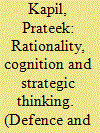| Srl | Item |
| 1 |
ID:
108940


|
|
|
|
|
| Publication |
2011.
|
| Summary/Abstract |
For decades deterrence has been understood to depend largely on psychology-convincing an adversary that certain actions are not in the adversary's best interests. However, beyond a token mention, contemporary discussions of deterrence seldom examine further the role of psychology and brain function in human decision making in matters of war and violence. Instead, deterrence planners typically rely on the rational actor model as a convenient simplifying assumption. The rational actor model itself is comprised of corollary assumptions that do not comport with scientific findings or empirical evidence from historical studies. This article examines the development of the human brain, human cognition (the process of knowing), and relevant findings from the field of evolutionary psychology, as well as various factors that affect brain function and decision making. The discussion herein of psychology, human cognition, and deterrence suggests the inadequacy of the rational actor model for deterrence planning and offers a few useful guidelines as an alternative.
|
|
|
|
|
|
|
|
|
|
|
|
|
|
|
|
| 2 |
ID:
132587


|
|
|
|
|
| Publication |
2014.
|
| Summary/Abstract |
A fundamental debate in international relations pertains to the application of rationality and context to different situations. Rationality is a hugely debated concept in philosophy. Across disciplines, the conceptualization of rational thought and practice provides various puzzles and problems. Yet, it is the most in?uential concept in modern day parlance and forms the foundations of approaching any problem. To be rational, according to Plato, is to let reason govern all intrinsic human thinking. He says reason is the supreme quality of human beings which gives them their unique character. The internal re?ective process of a human being is what gives him/ her an evolutionary advantage. Knowledge, according to rationality, is
innate and achieved through continuous reflection and processing. One's surroundings, undoubtedly, constrain or enable reason but the latter is the final instrument through which human beings have the ability to shape the environment to their advantage. Aristotle considered reason analogous to a charioteer who steers the seemingly irrational aspects of human thinking i.e. spirit and appetite. Further, there are myriad debates within the concept of rationality itself.
|
|
|
|
|
|
|
|
|
|
|
|
|
|
|
|